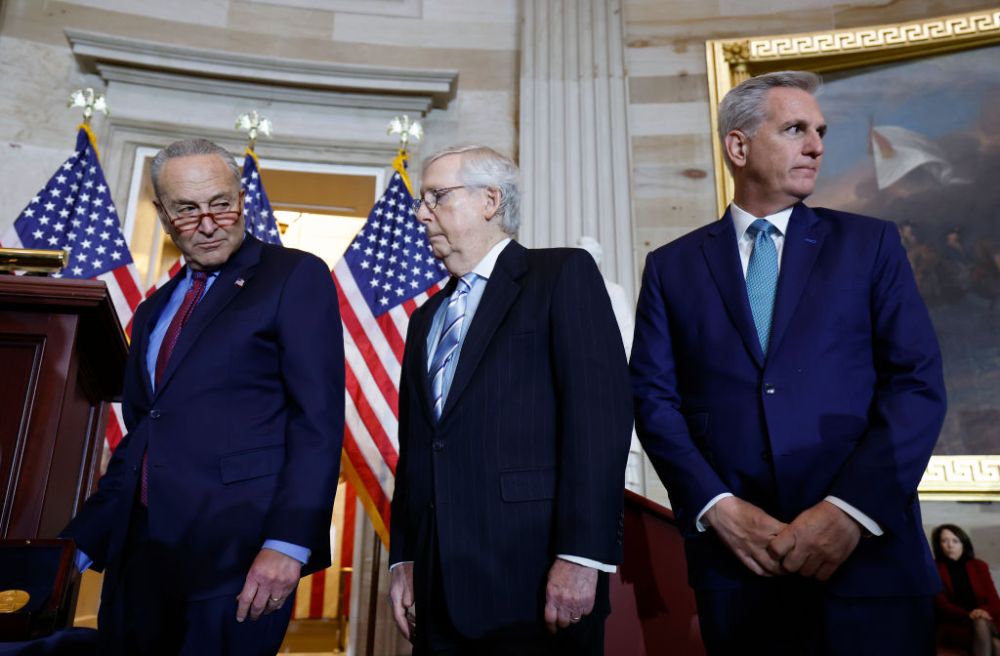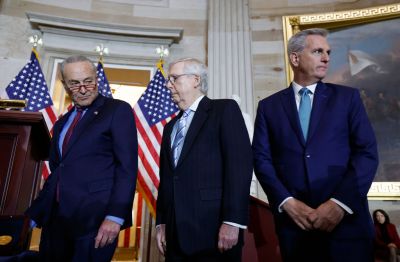House GOP Leader Kevin McCarthy wants Congress to delay passing a government funding package until Republicans control the chamber in January and have more leverage to enact their priorities. But some of McCarthy’s GOP colleagues in the Senate openly question his ability to manage a high-stakes spending negotiation with such a tight majority.
Mississippi Republican Sen. Roger Wicker said this week that it’s “better not to have that major hurdle that the new speaker, Kevin McCarthy, has to negotiate.”
“It’s too much to ask,” he told reporters.
And Sen. Richard Shelby, the top Republican on the appropriations panel, brushed off McCarthy’s opposition as politically motivated: “He’s running for speaker. He’s supposed to say that.”
The debate will play out in the coming week, as Senate negotiators hope to advance a deal for a sweeping government spending package before Christmas. To become law, it needs support from at least 10 Republican senators—but they face pressure from their House counterparts, conservative media, and think tanks to oppose it. Senate Republican Leader Mitch McConnell may have to rely on a coalition of allies who will grit their teeth and vote for it and retiring members who won’t worry as much about political blowback.
But it’s tough to predict exactly how the votes will land: The legislation isn’t finalized yet, and few lawmakers have clear knowledge of what will be included beyond reports that it will total roughly $1.7 trillion. Negotiators expect the legislation to be released as soon as Monday. Congress approved a one-week government funding stopgap measure this week, averting a deadline that had been set for midnight and giving staff more time to write the larger spending package. Congressional leaders want to avoid passing another stopgap spending measure or shutting down the government altogether.
One argument in favor of the package, for Senate Republicans: It will likely fund more aid to Ukraine. The Biden administration requested roughly $40 billion more in Ukraine aid last month. Passing a spending package now would skirt divisions among House Republicans in the new Congress that could threaten future support to the country as it defends itself against Russia.
That’s an issue McConnell has been outspoken about.
“Every day Russia spends on the back foot in Ukraine degrades its own ability to wage further wars and dramatically changes the cost-benefit calculus for others who might contemplate similar violence,” McConnell said on the Senate floor earlier this week. “Continuing support for Ukraine is the popular mainstream view that stretches across the ideological spectrum.”
Supporters may also point to the Pentagon’s requests for full funding of the military rather than another continuing resolution that would keep funding levels largely the same. The government has been operating on stopgap spending measures since the start of the fiscal year at the end of September. With a full spending bill, the military will be able to enact pay raises and start new initiatives.
Republican opponents take issue with the process, as well as the concept of new spending on domestic priorities after Democrats passed massive climate, health care, and pandemic relief bills in the first two years of President Joe Biden’s term. They questioned how much time lawmakers will have to read the legislation before being expected to vote on it next week.
“If you as a reporter that covers the House of Representatives, which is about to pass trillions of dollars, and you don’t even know what the baseline is yet and they want to vote on it next week, I don’t think it’s just us being cut out,” McCarthy said during a press conference Wednesday. “I think the American public is being cut out.”
McCarthy also pointed out that the two senators who largely negotiated the deal, Shelby and Democratic Sen. Pat Leahy, are set to retire before the new Congress begins. House Republicans said this week that if they had the chance to negotiate the spending package in the new year, they would require spending cuts for domestic programs and increased funding for border security.
A group of Republican senators also convened a press conference Wednesday to argue leaders designed the process to force members to agree to the bill. Running up against a deadline close to Christmas, they said, incentivizes lawmakers to pass the legislation as quickly as possible to avert a government shutdown and go home for the holidays instead of cautiously deliberating a massive bill.
Lobbyists and other lawmakers, meanwhile, are pushing to add bills to the package that could have trouble passing in a Republican House. Senate Majority Leader Chuck Schumer said he anticipates it will include a bill clarifying the symbolic role of the vice president in Congress’ certification of Electoral College votes, a response to former President Donald Trump’s efforts to overturn the 2020 election results.
Immigration priorities are also at top of mind: One such bill, the Afghan Adjustment Act, would create a pathway to permanent legal residency for tens of thousands of Afghans who came to the United States in the run-up to and aftermath of the Taliban’s 2021 takeover. The Afghans currently in America are largely relying on special humanitarian parole, a temporary status that leaves them in legal limbo as they try to get jobs and move on with their lives. It will expire next year for many of those Afghans, absent action by the administration or Congress.
The legislation would establish a separate vetting process for Afghan allies who helped coalition forces during the two-decade war on Afghanistan. This would allow them and their families to sidestep the beleaguered Special Immigrant Visa program, which is beset with delays. (Read more about the bill in this Uphill edition from earlier this year.)
The bill has 143 cosponsors in the House, only 10 of whom are Republicans. In the Senate, it has five Republican cosponsors alongside four Democrats.
Departing Michigan GOP Rep. Peter Meijer, a supporter of the bill, called for it to be included in the spending package.
“This is a critical issue to the veterans community and has been worked on behind the scenes for months,” he wrote. “We cannot further abandon the Afghan allies who risked their lives on behalf of our nation!”






Please note that we at The Dispatch hold ourselves, our work, and our commenters to a higher standard than other places on the internet. We welcome comments that foster genuine debate or discussion—including comments critical of us or our work—but responses that include ad hominem attacks on fellow Dispatch members or are intended to stoke fear and anger may be moderated.
With your membership, you only have the ability to comment on The Morning Dispatch articles. Consider upgrading to join the conversation everywhere.